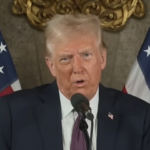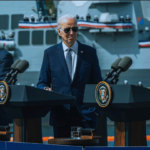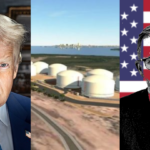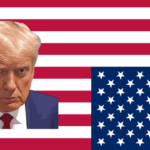Will an Expansionist Trump Turn His Colonial Gaze Towards Australia?
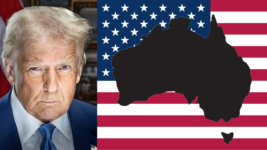
As the nation heads to the ballot on 3 May 2025, Civil Liberties Australia (CLA) has suggested to the Australian constituency that as it heads to the vote “the spectre of rabid, fanatical” and indeed, expansionist US president Donald Trump is now hanging over “every nation on Earth”, and this could pose an existential threat to us if he turns his colonising gaze toward northern Australia.
This assertion is sure to be meet with claims of sensationalism, as this concept was close to unthinkable prior to Trump having suggested during a 7 January speech that his coming administration had its eye on annexing Canada, was seeking to acquire control over Greenland, a Danish self-governing territory, and he was wanting to reinstate US control over the Panama Canal.
As the British pulled out of Asia in the Second World War, our nation turned to the US, as a new imperial protector, which culminated in the signing of the 1951 ANZUS treaty, and this long-standing agreement makes the idea being put by CLA appear unlikely. However, such dismissals are getting increasingly harder to make as Trump has been digging in his heels over his desire for Greenland.
The US president reiterated on 29 March that the US needs “Greenland for international security”, and he added that it is not a question of whether his nation can do without it, because it can’t, and he reiterated that he is trying to shore up “international security”, and this idea is further being reinforced as the US has a military base in Greenland, so it’s already providing regional security.
The US claim to Greenland involves one base, the Pituffik Space Base, which was establish in 1951, under an agreement with Denmark, that also permitted a US presence on the island since the 1940s. However, the US presence on this continent is much greater than that in Greenland, so any colonial designs Trump may have could easily be put down to regional and international security needs here.
The suggestion is the US is under attack
“As Canada votes, urgently, this month, and as Greenland-Denmark and nations like Colombia, Venezuela and Ukraine fight off hostile land and asset grabs, how long will it be before a sudden brain explosion covets large parts of Australia for the benefit of America?” Civil Liberties Australia chief executive Bill Rowlings suggested this week.
“The north and west are strategic military assets holding monumental mineral wealth, underneath the picture-perfect Great Barrier Reef allegedly lie untapped oil reserves, and the south provides some of the world’s best golf courses,” he continued.
“Who knows on which square of the Trump Monopoly board his token thinking might land?”
Trump is framing his isolationist and expansionist vision of making “America great again” on the claim that the US, with the largest economy and most formidable military on the planet, has long been under attack not solely by its opponents, but also via the nations friendly to the United States, many of whom have allegedly taken advantage of the good nature and generosity of the superpower.
The global tariff war that Trump launched on 2 April targeted not only United States opponents around the globe, such as China, but Washington has now imposed harsh tariffs on some of its closest allies, like the UK, South Korea, Japan and Australia. And the tariff regime and Trump’s designs on allied territory, make no secret of the fact that US friends are not beyond rebuke.
Rowlings further warns that the “next Australian government must reverse course on some 80 years of obsequiousness”, a demand he is making upon whichever party or coalition of parties forms government post-the May federal election.
The next Australian government “must promulgate and maintain a sustainable position in future world affairs, both defensive and opportunistic, as the old order dwindles and dies and new alliances surface”, the rights expert told Sydney Criminal Lawyers.
Soft colonisation of the top end
Assertions that Washington might have designs in the north and west of this continent have been increasing over the last few years, due to the Biden administration having broadened its local military presence quite dramatically over its time in office.
Former Australian foreign affairs minister Bob Carr suggested in mid-2023 that US encroachments into this country’s top end are sinking us “into the role of US territory, as much a dependency as Guam or Puerto Rico”, while former PM Paul Keating described this process last year, as the US attempting to turn Australia into a 51st US state, similar to Trump’s current designs on Canada.
Former Australian ambassador to Japan turned alternative media publisher and journalist John Menadue has been warning of US colonisation in the north of the country for a number of years now. And such well respected establishment figures would not be prone to come out making such bold claims about our nation’s closest ally, unless they have sound reasoning behind it.
Unlike Greenland, the US has two bases on local soil. There is the 1960s established Pine Gap US-Australia Joint Defence Facility, which collects signals and intel via satellites surveilling large tracts of the planet, while North West Cape in Western Australia has been facilitating communications for US and Australian submarines and ships for more than 70 years as well.
But unbeknownst to many Australians, the US began staking a greater local claim with the signing of the 2014 Force Posture Agreement, which aligned with the US Obama administration’s ‘pivot to Asia’. Indeed, three force posture initiatives, permitting the US to launch wars from local territory, have been established under the agreement and a fourth new presence is now underway.
The US force posture initiatives on this continent include the rotational presence of 2,500 US Marines, as well as an emphasis on making the US and Australian air forces increasingly interoperable, and the US has also been provided unimpeded access to an undisclosed number of local “facilities and areas”, of which it takes full control of if it decides it is going to upgrade a base.
Currently, the US military is renovating RAAF Base Tindal in the Northern Territory, and part of this will involve stationing six B-52 bombers in the north of the country, aimed at China, and it has further come to light that as our nation respects Washington’s policy of ‘warhead ambiguity’, we will have no idea whether these planes or any other US vessels stationed here are carrying nuclear weapons.
The 2021 AUKUS pact with the US and the UK has further shown Australia providing Washington with greater control over its military assets, as the nation has entered into an agreement with the US to acquire nuclear-powered submarines (SSN), which the White House may never provide, but, as of 2027, the US and UK will have established a joint US and UK SSN presence at WA’s HMAS Stirling.
So, with the strategic importance that this country provides the US, in terms of deterring China and launching attacks upon the East Asian giant, coupled with the much greater military presence it has on this island compared to that in Greenland, it would appear that Trump, and indeed, the rest of the US establishment, have likely been long looking at this continent with expansionist desires.
Clearing any confusion pre-ballot
“Before they secure our vote,” Rowlings continued addressing majors, minors and independents, “the candidates for federal seats should tell us how they, individually, will approach the next three and half years of Trump.”
“The parties in particular must delineate clear, defined, public positions which they will adhere to,” the rights advocate suggested. “We need to know what the broad sweep of those positions are, in outline if not in precise detail, before we cast votes.”
The CLA CEO further considers that “at the very least”, candidates for the federal election should make it known, as has Canada, that this country will remain a sovereign nation, and in line with the proposed land grab in Greenland, that Australia is not for sale.
Rowlings also posits that the Trump administration and its “distasteful meddling in other nation’s affairs”, will in the future be a momentary blemish on an otherwise strong relationship with the United States. However, there is always the opportunity for the Republicans to further progress this new era of American expansionism – that is if Trump doesn’t work out a way to run again for office.
Looking more broadly, Rowlings added that the parties and candidates running in the May vote “must tell us in advance where they stand on righting the historic and current wrongs against First Nations people, and as well, how they will vote individually on legislating a Human Rights Act for Australia in the next 18 months, before December 2026”.
“Before parties and politicians plead for our vote, they must tell us where they stand – and where and how they will position Australia, over the coming waves of the Trump administration,” he made certain on concluding.



